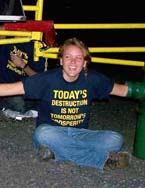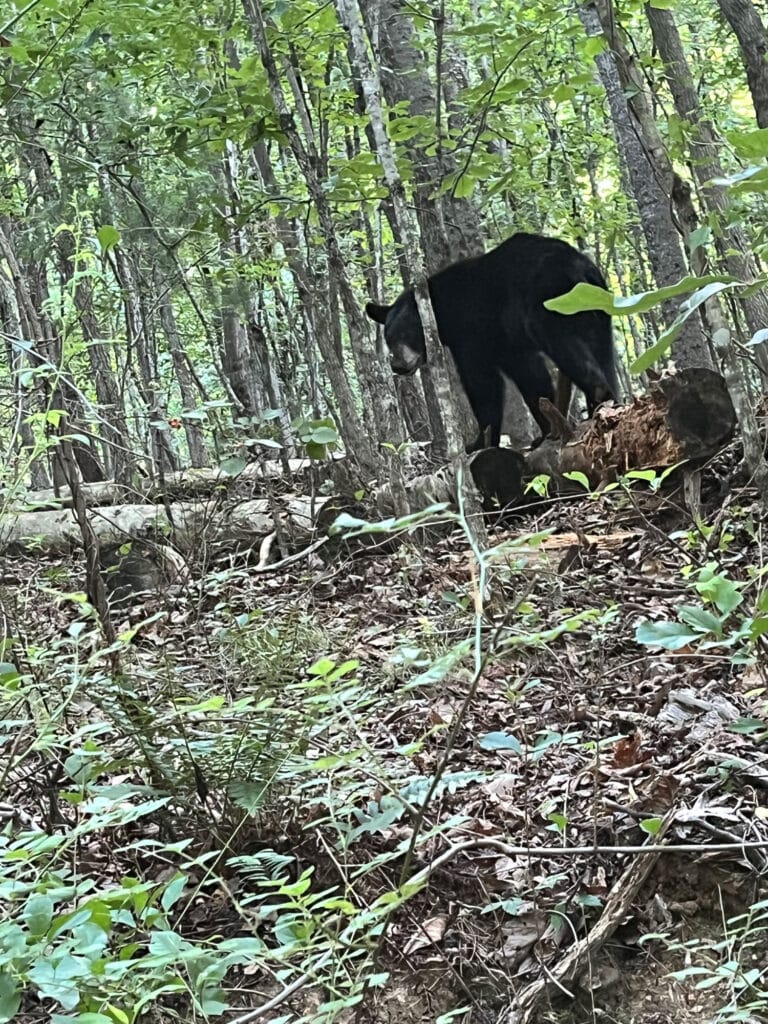At 6am, we arrived at the entrance to the construction site of Dominion Energy’s $1.8 billion coal-fired power plan in Wise County, Va. In a meticulously planned order, we unloaded the concrete-filled barrels in pairs and strapped ourselves to them within 90 seconds. There was a sigh of relief and then shouts of exaltation when we realized that we had blocked the gated entrance.
On site, there were nearly 30 of us all together, each filling an integral role. I was one of eight people chained to the seven barrels that were stretched out in a row across the construction site entrance. Two others were chained to the gates. Others sang, played banjo, gave media interviews, and waved banners to passing cars. Off site were many other supporters working to alert the media of the action and solicit lawyers for legal counsel. The blockade involved thousands of activists and required months of preparation.
Dozens of police soon arrived on the scene. Their flashing blue lights cast an eerie glow on the faces of my compatriots, but there were smiles on our mouths and a steady exchange of stories and songs that kept our spirits high. For years we had stood up to the injustices of the coal industry, but on September 15, it was time to sit down…and refuse to move.
In the end, I was arrested, along with ten others. But the corporations that destroy our communities and our future are the true criminals.
The history of resistance to injustices is rich in the coalfields of Appalachia. Our blockade was inspired by a previous act of civil disobedience that had taken place just a few miles down the road from us: 99 coal miners and one preacher participated in the famous United Mine Workers of America strike against unfair labor practices.
The act of using one’s body a tool, as an obstruction, has been a successful tactic for people protecting their rights and heritage. From childhood, we learn about the heroic acts of Civil Rights warriors such as Rosa Parks and Martin Luther King, Jr. We see pictures of the massive anti-war marches in Washington D.C. in the 1960s. But these revolutions are not reserved for history books and PBS documentaries. We are living in a period of immense change, on the cusp of a growing movement for social and environmental justice. And the change-makers are not just the figures memorialized in the history books; they are the people who walk in a world of injustice every day and then one day decide to take action.
No longer can we expect to better our world merely from behind a computer screen. Chain emails and online petitions mean nothing without the power of the people rising up and making the changes themselves. Our bodies, our voices, and our communities are sources of power that we can utilize to protect our homes, our health, and our communities. And we must stand in solidarity with others who fight these same battles, because, as Martin Luther King, Jr. said, “Injustice anywhere is a threat to justice everywhere.”
When Dominion’s plans for the Wise County coal-fired power plant were announced in early 2007, we quickly realized that it would destroy the health of our community. Slated to emit 5.3 million tons of carbon dioxide, to consume one million gallons of water per day from the Clinch River (the community’s water source), and to exacerbate the highly destructive practice of mountaintop removal mining, this plant is by no means a good investment for our future.
We investigated Dominion’s practices, exposing the truth behind their campaign for a green public image. We attended Board of Supervisors meetings, calling on the local government to protect their people. When Wise County’s elected leaders would not take action, we let other communities across the state set the example for them. Town councils and county boards of other communities passed resolutions against the power plant. But still nothing changed.
We followed Governor Tim Kaine to every one of his public appearances for months, asking him to stop the coal plant and make Virginia a leader in clean energy. We called him on the radio and asked questions at town hall meetings across the state. But still nothing changed.
We went through the regulatory process, filing thousands of comments against every permit Dominion needed to build the plant. We attended public hearings in droves, hundreds of us filling the rooms of the hearings, and people testifying one after another for twelve continuous hours. But still nothing changed.
We gathered 46,000 signatures of people demanding that the plant be halted and the $1.8 billion cost of the plant be put toward providing clean, renewable energy. But still nothing changed.
When you ask a politician, “What can I do to make my voice heard?” more than likely he will respond, “Vote for me.” But what will he say when you tell him you already did that and nothing has changed? “Write me a letter.” And what if still nothing has changed? You organize.
They thought we would be exhausted after jumping through all the hoops of comments, permits, and public hearings. Instead, the corruption of the political process inspired even more people to take action. The statewide coalition Wise Energy for Virginia has filed a lawsuit to stop construction of the Dominion power plant.
The communities of Appalachia are sending a clear and resounding message: We won’t stop until you do, Dominion.









